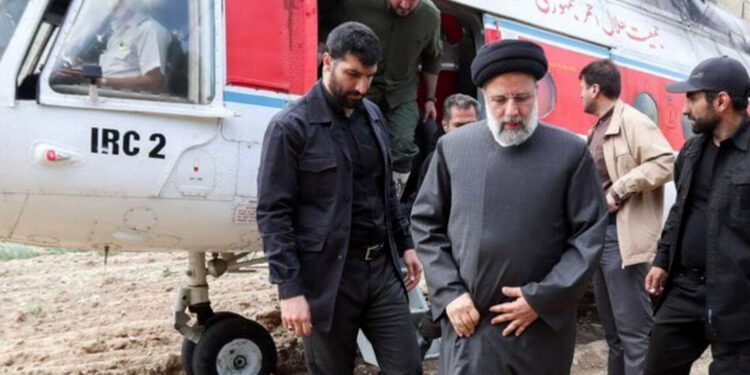Al Jazeera Net correspondents
Tehran- With the announcement of the loss of Iranian President Ebrahim Raisi’s helicopter yesterday afternoon, Sunday, Iranian markets reacted negatively to the news very quickly.
From the first moments of the news, the price of one gram of gold rose to 3 million and 570 thousand tomans (85.7 US dollars), thus registering a 10% increase compared to the morning of the same day.
As for the US dollar, it reached 60 thousand tomans, recording an increase of 6% in the first hours of the day of the accident.
It is noteworthy that Iranian markets witnessed severe fluctuations with unconfirmed news circulating about the death of the president and his entourage.
Central bank intervention
In this context, economics professor Isaac Saedian pointed out that the Central Bank has been trying hard to maintain the calm of the currency and gold markets since the start of the war in the Gaza Strip, and specifically since the Iranian attack on Israel.
Saidian added in his interview with Al Jazeera Net, “Today, Monday – that is, the day after the loss of the president’s helicopter – we witnessed a noticeable intervention by the Central Bank to control the markets, and on the other hand, the state suspended the stock market to avoid a possible collapse.”
Saeedian expected that the Central Bank would continue the policy of controlling the markets and maintaining relative calm, but there are indications that this situation will not continue in the long term, especially with the Iranian economy lacking the required growth.
He explained that the Iranian economy is now trying to increase its oil sales, and since most of the Iranian oil is heading towards China, there is a problem that Beijing relies on bartering Iranian oil with Chinese goods, which creates chaos in the Iranian economy and increases the budget deficit due to the lack of cash provision. This makes the central bank unable to continue its policy of controlling the markets.
Economics dependent on politics
On the other hand, economics professor Morteza Faghih explained that the Iranian economy, like many oil-exporting countries, depends on selling oil and receiving goods needed by the production and consumption sectors, and therefore any decision or accident that leads to a defect in this structure will directly affect economic variables and indicators.
Ofaqah continued in his interview with Al Jazeera Net that in such a case, the monetary and financial policies common in economic concepts are not effective enough to control economic crises, and for this reason and after the tightening of broad trade and financial sanctions by the United States against Iran – which were imposed on the country’s economy from the beginning 2018 – Economic indicators and variables were strongly linked to the process of easing or increasing sanctions.
He added that from that date until now, any positive or negative developments in political and trade relations with other countries – especially with Western countries and America – directly affect the country’s economic variables.
Afqeh said that Iran’s economy’s dependence on oil sales has led to the fact that even news related to external developments that lead to optimism or pessimism in economic factors affect economic indicators. In other words, economic indicators and variables in the country’s current circumstances are affected by non-economic variables – especially political variables – instead of Affected by the government’s economic policies.
It is clear that such a situation is not suitable for the country, because it limits the effectiveness of the government’s actions and policies to control and manage the economy, especially in crisis situations, for example the Gaza war, and as a result of the Israeli attack on the headquarters of Iranian diplomats – which was followed by mutual attacks between Iran and Israel – It immediately affected the currency and gold markets, according to his horizon.
Shortage of foreign currencies
Ofeqa added that if the government had enough foreign currencies at its disposal, it could prevent the crisis to some extent, but due to the continued strict sanctions and trade and financial restrictions – especially with regard to selling oil and receiving its money through the international banking system, and even if the bank had… The Central Bank is the currency necessary to manage the market – as a matter of caution, it cannot be interfered with and managed smoothly.
For this reason, in conditions of crises related to foreign relations, the price of the currency and gold rises, and depending on the continuation or calm of the crisis, the price of these two commodities rises or falls accordingly, in the opinion of his horizon.
According to Ufaqa, in the accident of the President and his companions’ helicopter crash, it was expected that the economic markets would ignite and economic actors concerned about the future situation would rush to convert monetary assets into currency and gold, but since the incident was local, it is difficult for there to be any change. This did not happen in relations. Political and external trade, the initial increase in currency and gold prices is unlikely to continue, and normal conditions are likely to return after a day or two.
He concluded that, in general, the state of instability in the markets and the stock market is likely to subside next week, and with this description, if the possibility of foreign interference in the president’s helicopter crash is raised during the coming days, the situation will change and there will be a possibility of worsening instability in the economic markets.



